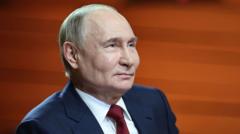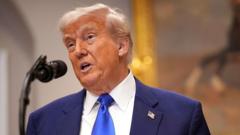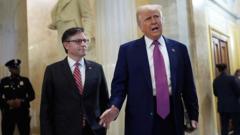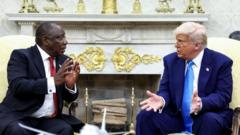With a bold move that could disrupt daily business transactions valued at nearly $5 billion, President Trump has announced a potential 50% tariff on European imports, prompting significant concern from EU officials who have approached negotiations with traditional diplomatic norms.
Trump's Tariff Threats Spark Economic Tensions with the EU

Trump's Tariff Threats Spark Economic Tensions with the EU
President Trump's proposed 50% tariff on European imports raises concerns of escalating trade tensions.
The ongoing economic dialogue between the United States and the European Union is reaching a boiling point, following President Trump's recent announcement of a proposed 50 percent tariff on European imports, effective June 1. This bold declaration, made via a Truth Social post, cites the EU's policies as key contributors to an unacceptable trade imbalance with the U.S.
"Europe has been very difficult to deal with," Trump stated, alleging that the economic bloc was formed primarily to exploit trade relations with the United States. As a result of this aggressive stance, tensions are rising between two of the world’s largest economies.
For the past several months, negotiators from the EU have approached the discussions with the hope of finding an amicable resolution. They seemed to believe they were engaging with a partner. However, this contrasts sharply with Trump’s confrontational approach, viewing the negotiations instead as a means to impose concessions on what he perceives as a commercial rival.
Trump's administration has a history of imposing tariffs on various sectors, including steel and aluminum, with implications for everything from cars to pharmaceuticals. Although he had previously announced a pause on certain tariffs to examine trade agreements, his latest proposition marks a significant escalation in the ongoing trade dispute.
As the situation unfolds, the implications of such tariffs could ripple across markets, affecting daily transactions that see nearly $5 billion in goods and services exchanged between the U.S. and EU. The stark divide in negotiation tactics raises questions about the future of transatlantic trade relations, as European officials seek a resolution while facing a U.S. administration willing to challenge longstanding norms.






















